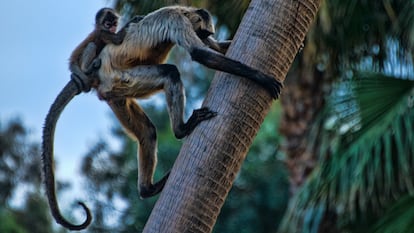Ice pops cool down monkeys in Brazil at a Rio zoo during a rare winter heat wave
It’s technically still winter in Brazil with spring due to start in a couple of days. But a heat wave has engulfed the country since the beginning of the week

Upon spotting a zookeeper laden with a bucket full of fruit-flavored ice pops, black spider monkeys in Rio de Janeiro’s BioParque gracefully swung their way towards him on Friday, chattering excitedly.
While it’s technically still winter in Brazil, with spring due to start on Saturday, a heat wave has engulfed the country since the beginning of the week, causing humans and animals alike to eagerly greet any chance of cooling down.
“Normally they get a break from the heat in the winter, but it’s been so hot. They have even shed their winter layer of fur,” said zookeeper Tadeu Cabral, who handed out some treats, while others were scattered around.
The ice pops are part of the monkeys’ well-being program. They provide thermal comfort, and dispersing the popsicles in different locations also stimulates their behavioral need for foraging.
For the monkeys, the ice pops are watermelon, pineapple or grape flavored. But for Simba, the zoo’s lion, the ice treat is made up of blood or minced meat.
Koala the elephant, now more than 60 years old, was rescued from a São Paulo circus in the 1990s. She wrapped her trunk around the block of frozen fruit, placed it under her foot and squashed the treat, before slurping it up.
To cool her down even more, a zookeeper sprayed Koala with a hose.
“Elephants love water. She also throws mud on her back to protect herself from the heat and parasites, like mosquitoes. When wet, the mud layer gets thicker and helps her even more,” said Daniel Serieiro, a biologist at the zoo.
Carlos Acuña, a tourist from Costa Rica, looked on as Koala was sprayed with water.
“It’s great that they’re showering her, that they are making her feel comfortable. The heat is so intense,” he said.
Temperatures are due to exceed 40 C (104 F) in São Paulo state and the central-west and north regions, according to the National Institute of Meteorology.
Abnormally high temperatures, caused by global warming, increase the risk of wildfires. On Thursday, firefighters in Brazil’s northeastern Bahia state battled flames fanned by strong winds.
Sign up for our weekly newsletter to get more English-language news coverage from EL PAÍS USA Edition
Tu suscripción se está usando en otro dispositivo
¿Quieres añadir otro usuario a tu suscripción?
Si continúas leyendo en este dispositivo, no se podrá leer en el otro.
FlechaTu suscripción se está usando en otro dispositivo y solo puedes acceder a EL PAÍS desde un dispositivo a la vez.
Si quieres compartir tu cuenta, cambia tu suscripción a la modalidad Premium, así podrás añadir otro usuario. Cada uno accederá con su propia cuenta de email, lo que os permitirá personalizar vuestra experiencia en EL PAÍS.
¿Tienes una suscripción de empresa? Accede aquí para contratar más cuentas.
En el caso de no saber quién está usando tu cuenta, te recomendamos cambiar tu contraseña aquí.
Si decides continuar compartiendo tu cuenta, este mensaje se mostrará en tu dispositivo y en el de la otra persona que está usando tu cuenta de forma indefinida, afectando a tu experiencia de lectura. Puedes consultar aquí los términos y condiciones de la suscripción digital.








































